Bombay Talkies
- 2013
- Tous publics
- 2h 7m
IMDb RATING
6.6/10
5.9K
YOUR RATING
One hundred years of Hindi cinema is celebrated in four short stories showcasing the power of film.One hundred years of Hindi cinema is celebrated in four short stories showcasing the power of film.One hundred years of Hindi cinema is celebrated in four short stories showcasing the power of film.
- Awards
- 4 nominations total
Priyanka Chopra Jonas
- Self
- (as Priyanka Chopra)
Featured reviews
Bombay talkies is a true ode to 100 years of Indian Cinema. It celebrates life, emotions, relations, dreams of an ordinary human being. It celebrates the true art form of cinema. It doesn't glorify stardom.
All 4 stories are diverse, dealing with different socio-economic strata with the basic theme being the impact of cinema on a common man's life.
Away from all 'dishum-dishum' emotional atyachar, senseless stories, it tells us how cinema should ideally be.
Karan Johar's part was really stunning. It was undoubtedly and unbelievably, his best movie as a director, better than those emotional craps like K2H2 and K3G. It talked about sexual orientation, hypocrisy in society and turnmoil in relationships. The songs 'Lag ja Gale' and Ajeeb Dastaan hai ye' were used metaphorically and blended very beautifully with the story. Dialogues were witty and had many meanings.
Dibakar Banarjee's part was a true 'art cinema'. Full of sarcasm and metaphors and hence difficult to understand, it was genuinely the best of all the four flicks. Faizal Khan ( Nawazuddin) is a true genius. He plays the character of a man struggling to find a job who is a talented actor leading a mediocre life in a chawl, for whom a smile on his daughter's face matters more than his dreams and money. The EMU in a chawl sarcastically portrays the character of the protagonist and also Nawazuddin himself as he hasn't got his due still while he actually deserves much more.
Zoya Akhtar's part talked about childhood dreams and fantasies. The child-actor really left me spellbound. The story was very genuine and it raised a very sensitive topic, which should be a matter of debate.
Anurag Kashyap is my favourite and I went to the movie just because of him. But he actually disappointed me. Not because the flick wasn't good, but because I had lots of expectations from him. Still, Anurag kashyap's worst was better than the Karan Johar's best! It essayed the madness and love of the protagonist who is a big fan of Amitabh Bachchan and comes to the big city from Allahabad to deliver a piece of ' Murabba' .
Although each story looked simple, the plot and the characters were multilayered. Each story is open-ended and leaves a lot to think about after you leave cinema halls. It should be considered as a benchmark in the history of Indian cinema.
At the end, was a disgusting song trying to celebrate 100 years of Indian cinema. Well I guess it ended up being a sarcastic take on the STARDOM ( read it "StarDUMB") culture prevailing in Indian cinema.
Its a high time to realize that cinema is a reflection of the life of ordinary 'Homo Sapiens' and should not be used to glorify larger than life image of some aliens like RajniKant, Salman Khan, Shahrukh Khan et al.
All 4 stories are diverse, dealing with different socio-economic strata with the basic theme being the impact of cinema on a common man's life.
Away from all 'dishum-dishum' emotional atyachar, senseless stories, it tells us how cinema should ideally be.
Karan Johar's part was really stunning. It was undoubtedly and unbelievably, his best movie as a director, better than those emotional craps like K2H2 and K3G. It talked about sexual orientation, hypocrisy in society and turnmoil in relationships. The songs 'Lag ja Gale' and Ajeeb Dastaan hai ye' were used metaphorically and blended very beautifully with the story. Dialogues were witty and had many meanings.
Dibakar Banarjee's part was a true 'art cinema'. Full of sarcasm and metaphors and hence difficult to understand, it was genuinely the best of all the four flicks. Faizal Khan ( Nawazuddin) is a true genius. He plays the character of a man struggling to find a job who is a talented actor leading a mediocre life in a chawl, for whom a smile on his daughter's face matters more than his dreams and money. The EMU in a chawl sarcastically portrays the character of the protagonist and also Nawazuddin himself as he hasn't got his due still while he actually deserves much more.
Zoya Akhtar's part talked about childhood dreams and fantasies. The child-actor really left me spellbound. The story was very genuine and it raised a very sensitive topic, which should be a matter of debate.
Anurag Kashyap is my favourite and I went to the movie just because of him. But he actually disappointed me. Not because the flick wasn't good, but because I had lots of expectations from him. Still, Anurag kashyap's worst was better than the Karan Johar's best! It essayed the madness and love of the protagonist who is a big fan of Amitabh Bachchan and comes to the big city from Allahabad to deliver a piece of ' Murabba' .
Although each story looked simple, the plot and the characters were multilayered. Each story is open-ended and leaves a lot to think about after you leave cinema halls. It should be considered as a benchmark in the history of Indian cinema.
At the end, was a disgusting song trying to celebrate 100 years of Indian cinema. Well I guess it ended up being a sarcastic take on the STARDOM ( read it "StarDUMB") culture prevailing in Indian cinema.
Its a high time to realize that cinema is a reflection of the life of ordinary 'Homo Sapiens' and should not be used to glorify larger than life image of some aliens like RajniKant, Salman Khan, Shahrukh Khan et al.
'Bombay Talkies' celebrates Indian Cinema, which turned 100 this year. Its a celebration of films & its influence in the world.
An Anthology film consisting of four short films, directed by Anurag Kashyap, Dibakar Banerjee, Zoya Akhtar & Karan Johar, 'Bombay Talkies' entertains & pays tribute to magic of the Silver-Screen.
Karan Johar's Ajeeb Dastaan Hai Yeh tells the story of a condemned homosexual boy who exposes his friend's husband's sexuality to her, only to end her turbulent marriage. Johar delivers a heartbreakingly emotional story of frustration & love. He directs it unabashedly & the performances by Rani Mukerji, Randeep Hooda & Saqib Saleem, are remarkable.
Dibakar Banerjee's 'Star', an adaptation of Satyajit Ray's short story "Patol Babu, Film Star", tells the story of a failed actor who gets the opportunity to act as junior artist, thus living his life-long dream. Banerjee executes this sensitive story with tenderness & care. Nawazuddin Siddiqui is terrific in the lead-role, while Sadashiv Amrapurkar is delightful.
Zoya Akhar's Sheila Ki Jawaani tells the story of a little boy who dreams to become a dancer after he sees Katrina Kaif sizzling on the big-screen. Akhtar's Direction is perfect, but the Writing is loose. It doesn't register the impact one expects from it. However, the performances by Naman Jain & Ranvir Shorey are credible.
Anurag Kashyap's Murabba celebrates the euphoria of Amitabh Bachchan. A dying father asks his son to travel to the city of dreams just to let the film-legend have a bite of a home-made Murabba. Kashyap's treatment is highly entertaining. Vineet Kumar Singh delivers a natural performance, but its Sudhir Pandey who is simply astonishing. Bachchan himself makes a flattering appearance in this story.
On the whole, 'Bombay Talkies' may not be perfect, but its an experience worth watching.
An Anthology film consisting of four short films, directed by Anurag Kashyap, Dibakar Banerjee, Zoya Akhtar & Karan Johar, 'Bombay Talkies' entertains & pays tribute to magic of the Silver-Screen.
Karan Johar's Ajeeb Dastaan Hai Yeh tells the story of a condemned homosexual boy who exposes his friend's husband's sexuality to her, only to end her turbulent marriage. Johar delivers a heartbreakingly emotional story of frustration & love. He directs it unabashedly & the performances by Rani Mukerji, Randeep Hooda & Saqib Saleem, are remarkable.
Dibakar Banerjee's 'Star', an adaptation of Satyajit Ray's short story "Patol Babu, Film Star", tells the story of a failed actor who gets the opportunity to act as junior artist, thus living his life-long dream. Banerjee executes this sensitive story with tenderness & care. Nawazuddin Siddiqui is terrific in the lead-role, while Sadashiv Amrapurkar is delightful.
Zoya Akhar's Sheila Ki Jawaani tells the story of a little boy who dreams to become a dancer after he sees Katrina Kaif sizzling on the big-screen. Akhtar's Direction is perfect, but the Writing is loose. It doesn't register the impact one expects from it. However, the performances by Naman Jain & Ranvir Shorey are credible.
Anurag Kashyap's Murabba celebrates the euphoria of Amitabh Bachchan. A dying father asks his son to travel to the city of dreams just to let the film-legend have a bite of a home-made Murabba. Kashyap's treatment is highly entertaining. Vineet Kumar Singh delivers a natural performance, but its Sudhir Pandey who is simply astonishing. Bachchan himself makes a flattering appearance in this story.
On the whole, 'Bombay Talkies' may not be perfect, but its an experience worth watching.
Director Dibakar Banerjee is keener in establishing the little world his characters, both major and minor, inhabit. You are far more enthusiastic and involved with these people because Banerjee knits together the entire fabric of his creation rather than simply weaving the design; he allows his camera to capture the sight, the sound and the essence of his world and you are respond and reciprocate it to it more than you would to works by other directors. He is one of the best new Indian directors I have seen whose films have gotten far less credit than they deserve. Everyone talks about Karan Johar's or Anurag Kashyap's involvement and only a few (which includes me) may've gone for Bombay Talkies to watch out for Dibakar Banerjee. His segment is called Star and it comes right after Johar's opening segment; Banerjee's work simply blows the other segments out of water, and only Kashyap's Murabba is able to escape uninjured. But poor Zoya Akhtar's segment Sheila Ki Jawaani isn't very lucky, barely holding up to the standards of Banerjee's work. And Johar's hokey gay-themed segment seems flaccid in comparison.
I don't mean by saying all this that you should skip the other segments and only catch Banerjee's; Bombay Talkies is a far better offering than most other Indian movies you might catch in theaters. It's got a limited release and has managed to rake in mediocre box-office collections, but it surely deserves to be recognized for being novel not just for the sake of being novel. Four different directors with quite different styles and palettes put up their works for an anthology film and you as an audience member have a lot more to discuss here than just the quality of the film itself: you compare these filmmakers' works and form your own preferences. I loved Banerjee's work but I hear many other praising Karan Johar more, but you see what's happening here is that everyone's talking a lot more about the film than they usually would. For this alone people should catch Bombay Talkies before it exits theaters with its final salute to Bollywood.
Bombay Talkies, named after a prestigious movie studio of the same name which opened in the 30s and has closed down now, is a cinematic ode to celebrate the hundredth anniversary of Bollywood. This ode is sung by four directors: 1) Karan Johar, known for his epic-length melodramas with names usually beginning with letter 'K', 2) Dibakar Banerjee, a superbly talented director whose works evoke the multiplicities seen in Neorealist films 3) Zoya Akhtar, who has won a couple of awards in India and comes from a family of talented actors, musicians and lyricists and 4) Anurag Kashyap, whose works have been screened at Cannes. While Johar and Akhtar share this style of directing that many of the filmmakers who've been brought up in this industry from the start possess, Kashyap and Banerjee inject the flavor of world cinema into commercial Bollywood.
Johar begins first, his film being about Avinash, a lonely gay man estranged from his family who meets a lonely married straight woman whose sex life (with her husband, of course. Infidelity not usually tackled in Indian films) is sterile. There's the husband who is dull and lonely (and completely not aroused by his wife) and loves old Hindi songs, and things get complicated when Avinash meets the husband and his gay sensor tingles. You perfectly know what's going to happen next. Once Johar's done, its Banerjee's turn: his film is about a lower-middle class Maharashtrian (Nawazuddin Siddique, awards coming your way) whose many little ambitions, which includes breeding Emus, have never taken flight until the moment he gets the golden opportunity to share the screen space with megastar Ranbir Kapoor one day. If Banerjee makes us hate the theater owners for keeping an interval for the film, Zoya Akhtar's segment post-intermission about a little kid who hates football and likes dressing up like a girl and who idolizes actress Katrina Kaif makes us hate the film's editor for not including more of Dibakar's story. The final segment is a little queer and quirky, and it's by Kashyap; his film is about Vijay, an Allahabad native who, under his ailing father's insistence, travels to Bombay to offer the King of Bollywood half of a Murabba, a jam pickle, so that the other half, once blessed with Bachchan's uhm teeth could be consumed by Vijay's father to get well.
Johar's segment is simple are quite predictable; you are well aware what's going to happen and because it's a Johar film, you know there'll be a lot of tears shed by the characters. Apart from its hokey and hackneyed theme, I really wasn't sure whether it portrayed gays in a flattering light. Akhtar on the other hand makes a film full of annoyingly precocious children and one-dimensional characters, especially the kid's father who keeps repeating 'Football is a guy's game. Football will make you strong'. Anurag Kashyap's 'Murabba' is delicious and delightful, but not anywhere close to the richness of Banerjee's offering. There's so much to enjoy, so many little things that we watch happening in Banerjee's film, and he's a pro when it comes to handling his camera and sound. There's a common theme of father-son relationship running in all four shorts.
There's a music video after the shorts which celebrates the hundred years of Bollywood, and they've added a montage that shows Bollywood through the period. Towards the end, stars like Aamir Khan turn up but I was sadly disappointed by the presence of some actors like Sonam Kapoor here, which shows just how retarded Bollywood has become. Why couldn't they let Nawazuddin sing? Or Kalki Koechlin? When your entire film is about celebrating the true stars, why ruin the moment by bringing in the hundred crore club whose films are strapped on stars and short on sense?
I don't mean by saying all this that you should skip the other segments and only catch Banerjee's; Bombay Talkies is a far better offering than most other Indian movies you might catch in theaters. It's got a limited release and has managed to rake in mediocre box-office collections, but it surely deserves to be recognized for being novel not just for the sake of being novel. Four different directors with quite different styles and palettes put up their works for an anthology film and you as an audience member have a lot more to discuss here than just the quality of the film itself: you compare these filmmakers' works and form your own preferences. I loved Banerjee's work but I hear many other praising Karan Johar more, but you see what's happening here is that everyone's talking a lot more about the film than they usually would. For this alone people should catch Bombay Talkies before it exits theaters with its final salute to Bollywood.
Bombay Talkies, named after a prestigious movie studio of the same name which opened in the 30s and has closed down now, is a cinematic ode to celebrate the hundredth anniversary of Bollywood. This ode is sung by four directors: 1) Karan Johar, known for his epic-length melodramas with names usually beginning with letter 'K', 2) Dibakar Banerjee, a superbly talented director whose works evoke the multiplicities seen in Neorealist films 3) Zoya Akhtar, who has won a couple of awards in India and comes from a family of talented actors, musicians and lyricists and 4) Anurag Kashyap, whose works have been screened at Cannes. While Johar and Akhtar share this style of directing that many of the filmmakers who've been brought up in this industry from the start possess, Kashyap and Banerjee inject the flavor of world cinema into commercial Bollywood.
Johar begins first, his film being about Avinash, a lonely gay man estranged from his family who meets a lonely married straight woman whose sex life (with her husband, of course. Infidelity not usually tackled in Indian films) is sterile. There's the husband who is dull and lonely (and completely not aroused by his wife) and loves old Hindi songs, and things get complicated when Avinash meets the husband and his gay sensor tingles. You perfectly know what's going to happen next. Once Johar's done, its Banerjee's turn: his film is about a lower-middle class Maharashtrian (Nawazuddin Siddique, awards coming your way) whose many little ambitions, which includes breeding Emus, have never taken flight until the moment he gets the golden opportunity to share the screen space with megastar Ranbir Kapoor one day. If Banerjee makes us hate the theater owners for keeping an interval for the film, Zoya Akhtar's segment post-intermission about a little kid who hates football and likes dressing up like a girl and who idolizes actress Katrina Kaif makes us hate the film's editor for not including more of Dibakar's story. The final segment is a little queer and quirky, and it's by Kashyap; his film is about Vijay, an Allahabad native who, under his ailing father's insistence, travels to Bombay to offer the King of Bollywood half of a Murabba, a jam pickle, so that the other half, once blessed with Bachchan's uhm teeth could be consumed by Vijay's father to get well.
Johar's segment is simple are quite predictable; you are well aware what's going to happen and because it's a Johar film, you know there'll be a lot of tears shed by the characters. Apart from its hokey and hackneyed theme, I really wasn't sure whether it portrayed gays in a flattering light. Akhtar on the other hand makes a film full of annoyingly precocious children and one-dimensional characters, especially the kid's father who keeps repeating 'Football is a guy's game. Football will make you strong'. Anurag Kashyap's 'Murabba' is delicious and delightful, but not anywhere close to the richness of Banerjee's offering. There's so much to enjoy, so many little things that we watch happening in Banerjee's film, and he's a pro when it comes to handling his camera and sound. There's a common theme of father-son relationship running in all four shorts.
There's a music video after the shorts which celebrates the hundred years of Bollywood, and they've added a montage that shows Bollywood through the period. Towards the end, stars like Aamir Khan turn up but I was sadly disappointed by the presence of some actors like Sonam Kapoor here, which shows just how retarded Bollywood has become. Why couldn't they let Nawazuddin sing? Or Kalki Koechlin? When your entire film is about celebrating the true stars, why ruin the moment by bringing in the hundred crore club whose films are strapped on stars and short on sense?
What a wonderful act is that four talented directors come together with some of the great new-age actors to create an amalgamated cinema worth watching. But, is it the much-needed ode to Bollywood? Hands down, No!
Karan Johar starts off with a very bold story having marvelous performances by the lead actors. Great direction, dialogues & the elemental conviction is absolutely fantastic. The conclusion troubled me maybe due to incompletion but that's expected. And yes, it immortalizes homosexuality, 50 Shades of Grey & sex. 7.2/10!
Dibakar Banerjee teams up with the Siddiqui but fails to evince character depth & the real matter. Although, the emotive stance is appreciable, the momentum which is required to stand up in a movie of so much importance is low. Sadashiv Amrapurkar was good. 5.7/10!
Zoya Akhtar brings sweetness to the anthology with brilliant acting by child artistes. Although, the climax is a bit stale & illogical (so much crowd attraction for 2 kids), I liked the love, bonding, chasing-the- dream thingy & iotic traces of child-abuse involved in it. 6.3/10!
Anurag Kashyap's is the cynosure with a story so sharp & related (to native India), it makes a great ending story worth watching. Amitabh Bachchan's presence, the placebo effect-story, palpable plot & the lead character's expressions make it the best short. Great music. Splendid. 8.5/10!
Overall, a good show put up by the thespians & succeeds in marking a new wave of cinema making, but I really think all work was done hastily with the stories requiring little polishing & improvisation. Could have been better!
BOTTOM LINE: A good movie & can be considered one of 2013's few best! Recommended!
MESSAGE: Respect the LGBT community & understand that relationships is more than physical; make a person happy everyday; follow you dream surreptitiously; be with your parents when they need you & make their wish true.
Can be watched with a typical Indian family? YES
Profanity: Mild | Sex: Strong (No visuals) | Nudity: No | Violence: Strong | Gore: Very Mild | Alcohol: Mild | Smoking: No | Drugs: No
Karan Johar starts off with a very bold story having marvelous performances by the lead actors. Great direction, dialogues & the elemental conviction is absolutely fantastic. The conclusion troubled me maybe due to incompletion but that's expected. And yes, it immortalizes homosexuality, 50 Shades of Grey & sex. 7.2/10!
Dibakar Banerjee teams up with the Siddiqui but fails to evince character depth & the real matter. Although, the emotive stance is appreciable, the momentum which is required to stand up in a movie of so much importance is low. Sadashiv Amrapurkar was good. 5.7/10!
Zoya Akhtar brings sweetness to the anthology with brilliant acting by child artistes. Although, the climax is a bit stale & illogical (so much crowd attraction for 2 kids), I liked the love, bonding, chasing-the- dream thingy & iotic traces of child-abuse involved in it. 6.3/10!
Anurag Kashyap's is the cynosure with a story so sharp & related (to native India), it makes a great ending story worth watching. Amitabh Bachchan's presence, the placebo effect-story, palpable plot & the lead character's expressions make it the best short. Great music. Splendid. 8.5/10!
Overall, a good show put up by the thespians & succeeds in marking a new wave of cinema making, but I really think all work was done hastily with the stories requiring little polishing & improvisation. Could have been better!
BOTTOM LINE: A good movie & can be considered one of 2013's few best! Recommended!
MESSAGE: Respect the LGBT community & understand that relationships is more than physical; make a person happy everyday; follow you dream surreptitiously; be with your parents when they need you & make their wish true.
Can be watched with a typical Indian family? YES
Profanity: Mild | Sex: Strong (No visuals) | Nudity: No | Violence: Strong | Gore: Very Mild | Alcohol: Mild | Smoking: No | Drugs: No
My Rating : 7/10
Not often does Bollywood make something out of the ordinary. No song and dance routine here. Here we have four short segments directed by four well-known directors.
All four stories will appeal to a different audience and perhaps might even offend some for their respective themes explored.
Not your commercial, mainstream entertainment. Niche, subtle filmmaking it is.
Not often does Bollywood make something out of the ordinary. No song and dance routine here. Here we have four short segments directed by four well-known directors.
All four stories will appeal to a different audience and perhaps might even offend some for their respective themes explored.
Not your commercial, mainstream entertainment. Niche, subtle filmmaking it is.
Did you know
- TriviaPart one of the three (as of 2020) part series directed by the directors: Karan Johar, Anurag Kashyap, Dibakar Banerjee, and Zoya Akhtar. Others being Lust Stories (2019) and Ghost Series (2020).
- GoofsIn the Murabba story, when Vineet Kumar(Vijay) is talking to the Omelette guy, his lips move for a full sentence but only half of the sentence is audible in the vocal playback.
- ConnectionsFeatures Don, la chasse à l'homme (2006)
- How long is Bombay Talkies?Powered by Alexa
Details
Box office
- Budget
- ₹60,000,000 (estimated)
- Gross worldwide
- $1,789,657
- Runtime2 hours 7 minutes
- Color
Contribute to this page
Suggest an edit or add missing content



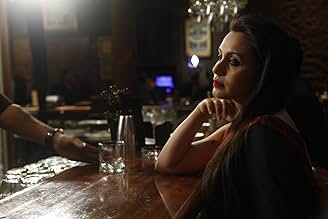

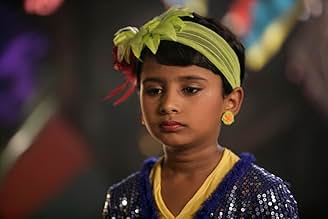
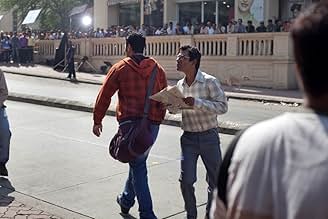
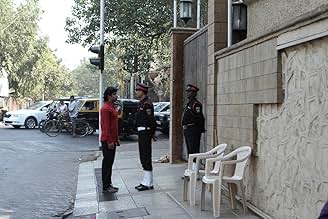
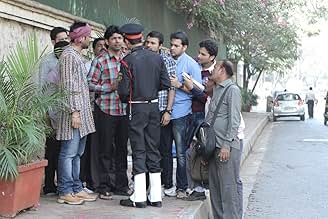























![Peepli [Live]](https://m.media-amazon.com/images/M/MV5BNDc1YTEwYmUtYTIxMC00Mjg4LWJmODctNGNiYjNjMTA3NjY5XkEyXkFqcGc@._V1_QL75_UY207_CR2)




